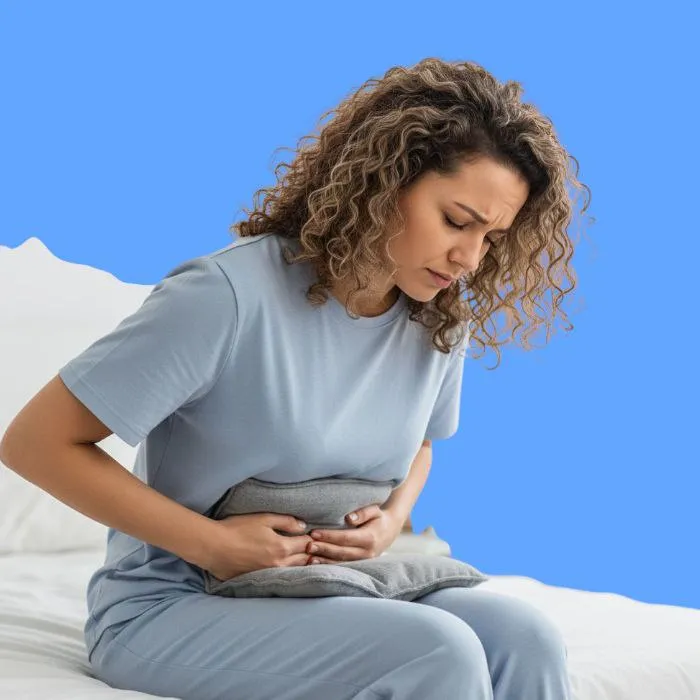What is polycystic ovary syndrome (PCOS)?
PCOS is one of the most common hormonal disorders among women of reproductive age. It occurs when small, fluid-filled sacs form within the ovaries, disrupting ovulation and increasing levels of certain hormones.
This condition can affect menstruation and fertility, and sometimes cause weight or skin problems.
What are the causes of PCOS?
There are several common causes of the condition, including:
- An imbalance in sex hormones.
- Insulin resistance, which increases blood sugar levels.
- Genetic factors and a family history of the condition.
- Excessive weight gain or obesity.
- Psychological stress and lack of physical activity.
What are the common symptoms of PCOS?
There are several common symptoms a patient may experience, including:
- Irregular or absent menstrual periods for long periods.
- Excessive hair growth on the face or body.
- Weight gain or difficulty losing weight.
- Acne and skin problems.
- Hair loss or thinning of the scalp.
When should you see a doctor?
It is recommended to see a doctor in the following cases:
- Irregular menstrual cycles for months at a time.
- Excessive hair growth or acne.
- Delayed pregnancy despite regular attempts.
- Sudden weight gain or difficulty losing weight.
- Constant fatigue or mood swings.
What are the methods for diagnosing polycystic ovary syndrome (PCOS)?
The disease is diagnosed using several methods, including:
The doctor begins by taking a medical history and performing a physical examination. He then orders blood tests to measure ovarian hormones and insulin.
Ultrasounds are also used to detect cysts in the ovaries and determine their size and number to confirm the diagnosis.
What are the methods for treating PCOS?

There are several methods for treating the disease, including:
- Regulating the menstrual cycle with hormonal medications.
- Medications to stimulate ovulation in cases of delayed pregnancy.
- Medications to reduce insulin resistance and improve metabolism.
- Lifestyle modifications through a healthy diet and exercise.
- Surgery is used to remove cysts in severe cases or cases resistant to drug therapy.
Is polycystic ovary disease curable?
The disease is not completely curable in most cases, but it can be effectively controlled with treatment and regular follow-up.
Symptoms can be reduced and fertility improved with adherence to medication and a healthy lifestyle that includes proper nutrition and regular physical activity.
What are the tips for preventing polycystic ovary disease?
There are a number of tips for preventing the disease, including:
- Maintaining a healthy weight through a balanced diet.
- Regular physical activity to improve insulin sensitivity.
- Avoiding foods high in fats and sugars.
- Managing stress through relaxation and adequate sleep.
- Regular follow-up with a doctor to monitor hormones and ovaries.
What are the potential complications of polycystic ovary disease?
Some complications may occur if treatment is not followed, such as:
- Infertility or difficulty conceiving.
- Increased risk of type 2 diabetes.
- High blood pressure and cholesterol disorders.
- Uterine lining problems due to hormonal imbalances.
- Increased risk of heart disease in the long term.
Frequently Asked Questions about Polycystic Ovary Disease
Is it possible to get pregnant with polycystic ovary syndrome?
Yes, it is possible to get pregnant after treatment or proper hormone regulation.
Does polycystic ovary syndrome go away after marriage?
No, marriage does not cure the disease, but it may help regulate hormones in some women.
Is it possible to lose weight despite polycystic ovary syndrome?
Yes, through a healthy diet and regular exercise.
Do polycystic ovary syndrome always cause abdominal pain?
Not necessarily, as pain only occurs in some advanced cases.
Article Summary
Polycystic ovary syndrome is a chronic hormonal condition that requires health awareness and ongoing medical follow-up.
Symptoms can be controlled and the chances of pregnancy improved through lifestyle modification and appropriate treatment.
Maintaining proper nutrition, exercising, and regulating hormones are essential steps to prevent complications and achieve a better health balance.